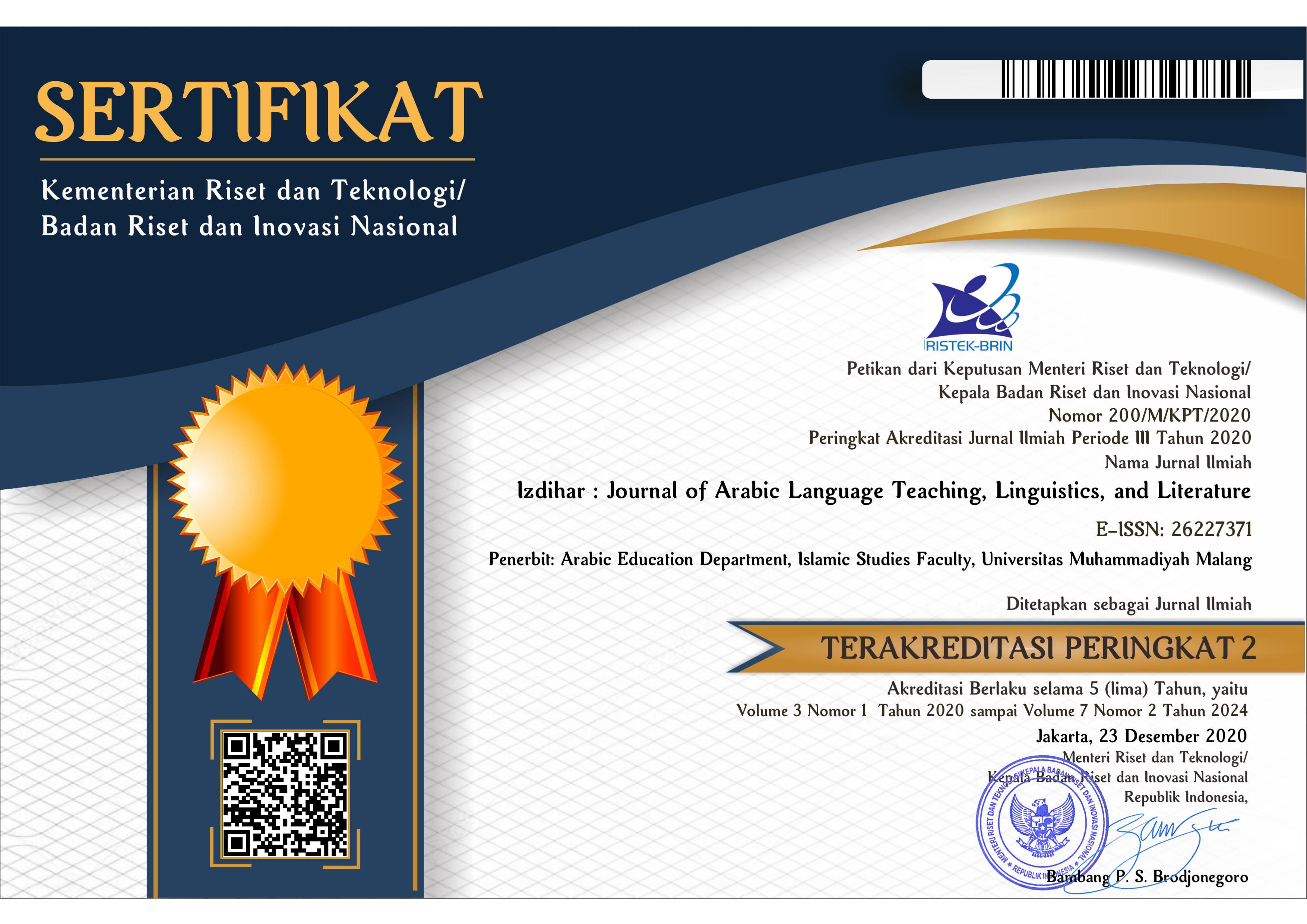Implementation of Activity-Based Language Week Program in Improving Arabic Communication Skills at Ma’had al-Jami’ah
DOI:
https://doi.org/10.22219/jiz.v5i1.19911Keywords:
Arabic Language; Communication Skills; Language Week;Abstract
Improving Arabic speaking skills for non-native speakers are faced with serious problems, so educational institutions must be able to make new breakthroughs in efforts to improve communication skills. Ma'had al-Jami'ah IAIN Padangsidimpuan determines that a program is seen as part of efforts to improve Arabic communication skills, namely "activity-based language week". This study aimed to describe the implementation of the activity-based language week program at Ma'had Al-Jamiah IAIN Padangsidimpuan in Arabic learning, especially maharah kalam projected as an alternative to reduce the problematic Arabic skills of PTKI students. This study was carried out with a qualitative approach where data were collected through participatory observation, interviews, and document studies. Data were analyzed using the Miles and Huberman technique consisting of collection, reduction, presentation, and drawing conclusions. Based on the results, the activity-based language week program was well implemented in four activities with various activities, namely ilqa' al-mufrodat, muroja'ah, hiwar practice, and muhadhoroh lughoh. These four activities were proven to be able to minimize the difficulties of students in learning Arabic based on improving skills in using Arabic as a means of daily communication. This study recommends further researchers to conduct trials related to the effectiveness of its implementation or examine the language week program.
Downloads
References
Abdikarimova, M., Tashieva, N., kyzy, A. T., & Abdullaeva, Z. (2021). Developing Students Verbal Communication Skills and Speech Etiquette in English Language Teaching. Open Journal of Modern Linguistics, 11(01), 83–89. https://doi.org/10.4236/ojml.2021.111007
Ajape, K. O., Mamat, A., & Azeez, Y. A. (2015). Students’ Motivation and Attitude Towards the learning of Arabic Language: A Case Study of Arabic Students in Nigerian Universities. International Journal of Economics and Financial Issues, 5(February), 122–127. https://doi.org/10.31436/ijes.v3i1.59
Alkhateeb, M. M. A. (2016). My mother tongue pulls my leg Arabic language interference in the acquisition of English language: An attempt to know. Journal of Education and Practice, 7(23), 96–102. https://www.iiste.org/Journals/index.php/JEP/article/view/32582
Alsaiari, H. (2015). Teaching Arabic through communicative language teaching approaches informed by new understandings of literacy in primary schools in Tabuk, Saudi Arabia [Western Sydney University]. In PQDT - Global (Issue December). https://search.proquest.com/docview/1949331543?accountid=9645
Amrullah, A. M. K., Nida, Z., & Al Anshory, A. M. (2020). Strategic Management of Arabic Language Learning Programs/ إدارة استراتيجية برنامج تعليم اللغة العربية. Ijaz Arabi Journal of Arabic Learning, 4(1), 160–178. https://doi.org/10.18860/ijazarabi.v4i1.10417
Anandi, R. P. (2021). Students ’ Attitude and Motivation towards Arabic Language. International Journal of Arabic Language Teaching, 1(1), 9–16. https://doi.org/https://doi.org/10.32332/ijalt.v3i02.3804
Çakir, I. (2018). Is Listening Instruction Neglected Intentionally or Incidentally in Foreign Language Teaching Contexts? Journal of Language and Linguistic Studies, 14(2), 154–172. https://www.jlls.org/index.php/jlls/article/view/865
Direktorat Pendidikan Tinggi Islam. (2021). Pedoman Penyelenggaraan Ma ’had al Jamiah Di Perguruan Tinggi Keagamaan Islam Negeri (PTKIN). DIKTIS Kemenag RI.
El-Omari, A. H., & Bataineh, H. M. (2018). Problems of learning arabic by non-arabic speaking children: Diagnosis and treatment. Journal of Language Teaching and Research, 9(5), 1095–1100. https://doi.org/10.17507/jltr.0905.25
Fikri, A., Muid, A., Ilhami, R., Norhidayah, H. M., Ilmiani, A. M., & Ikhlas, M. (2021). Arabic Learning in Industrial Revolution 4.0: Problems, Opportunities, and Roles. Izdihar : Journal of Arabic Language Teaching, Linguistics, and Literature, 4(2), 165–178. https://doi.org/https://doi.org/10.22219/jiz.v4i2.17069
Freestone, R. (2012). Futures Thinking in Planning Education and Research. Journal for Education in the Built Environment, 7(1), 8–38. https://doi.org/10.11120/jebe.2012.07010008
Ismail, A., Hassan, N. H., Malek, A. A., & Usman, A. H. (2019). Memorizing and understanding the qur’an in arabic language among malaysian students of the al-azhar institute of qiraat shobra, egypt. Humanities and Social Sciences Reviews, 7(4), 223–228. https://doi.org/10.18510/hssr.2019.7428
Kamal, H. (2021). The Influence of Online Game on the Learners’ Arabic Vocabulary Achievement. Jurnal Al Bayan: Jurnal Jurusan Pendidikan Bahasa Arab, 13(1), 16–31. https://doi.org/10.24042/albayan.v13i1.7339
Mahdi, R., & Lubis, A. A. (2020). Perspectives on the Arabic Language from University Student: Between Reality and Hope. Izdihar : Journal of Arabic Language Teaching, Linguistics, and Literature, 3(1), 45–58. https://doi.org/10.22219/jiz.v3i1.11757
Marlius, Y., Bambang, B., & Wirman, M. (2021). The Efforts to Improve Students’ Arabic Speaking Skills Through Language Environment Activation: A Study of Phenomenology. Al-Ta’rib : Jurnal Ilmiah Program Studi Pendidikan Bahasa Arab IAIN Palangka Raya, 9(1), 35–48. https://doi.org/10.23971/altarib.v9i1.2585
Mas’ud, M., & Anis, U. (2020). Model Kampung Arab Santri Bidik Misi Ma‘had Al-Jami’ah: Adopsi dan Adaptasi Kampung Arab Pare Kediri. Alsina : Journal of Arabic Studies, 2(1), 33. https://doi.org/10.21580/alsina.2.1.5947
Maturedy, F., Hidayanti, P. N. Y., & Haikal, H. (2020). Ta’lim al-Muhadatsah bi al-Lughah al-’Arabiyyah fi al-Ansyithah al-Idhafiyyah Li Thalabah Ma’had al-Jami’ah. Al-Ta’rib: Jurnal Ilmiah Program Studi Pendidikan Bahasa Arab, 8(2), 117–130. https://doi.org/https://doi.org/10.23971/altarib.v8i2.2185 ةعماجلا
Miles, M. B., & Huberman, A. M. (1994). Qualitative Data Analysis. In Sage Publication (2nd ed.). Sage Publication.
Mnasri, S., & Habbash, M. (2021). Study of the influence of Arabic mother tongue on the English language using a hybrid artificial intelligence method. Interactive Learning Environments, 1–14. https://doi.org/10.1080/10494820.2021.2012809
Morthy, D. K., & Abdul Aziz, A. (2020). The Use of Language Games in Enhancing ESL Learners’ Sentence Construction. International Journal of Academic Research in Business and Social Sciences, 10(9), 16–32. https://doi.org/10.6007/ijarbss/v10-i9/7695
Mufidah, N., Firdaus, U. Z., & Tahir, S. Z. Bin. (2018). Model Pengayaan Tutor Bahasa: Studi pre-learning pada Shabahul Lughoh di Ma’had Sunan Ampel Al Aly. At-Ta’dib, 13(2), 50–61. https://doi.org/10.21111/at-tadib.v13i2.2650
Mufidah, N., Sa’adah, N., & Kholis, N. (2019). Strategi Multilanguage untuk Pembelajaran Bahasa Arab: Studi di Ma‘had Students UIN Maulana Malik Ibrahim, Malang. Al-Ma’rifah, 16(01), 1–9. https://doi.org/10.21009/almakrifah.16.01.01
Mukmin, M. (2019). The Effect of Educational Background and Language Competence on Students’ Arabic Language Motivation. Arabiyat : Jurnal Pendidikan Bahasa Arab Dan Kebahasaaraban, 6(1), 36–52. https://doi.org/10.15408/a.v6i1.10484
Munthe, E., & Conway, P. F. (2017). The SAGE Handbook of Research on Teacher Education. SAGE Publications Ltd. https://doi.org/10.4135/9781529716627 NV - 2
Musthofa, T., & Ilham Rosyadi, F. (2020). Actualization of Behavioral Theory in Learning Arabic Speaking Skills at the Madrasah Aliyah Level. Universal Journal of Educational Research, 8(12A), 7343–7349. https://doi.org/10.13189/ujer.2020.082518
Nurcholis, A., Sirad, M. C., Harianto, B., & Hidayatullah, S. I. (2020). the Ontology of Arabic Curriculum At Pesantren Attahdzib Jombang. Arabi : Journal of Arabic Studies, 5(2), 153–165. https://doi.org/10.24865/ajas.v5i2.247
Park, P., & Lee, E. (2019). The impact of an arts project-based language program to enhance efl learning. Journal of Asia TEFL, 16(4), 1232–1250. https://doi.org/10.18823/asiatefl.2019.16.4.11.1232
Putri, A. H., Permatasari, F. E., Hijriyah, A. L., & Mauludiyah, L. (2021). Arabic Quizzes Game to Improve Arabic Vocabulary. Tanwir Arabiyyah: Arabic as Foreign Language Journal, 1(1), 47–54. https://doi.org/https://doi.org/10.31869/aflj.v1i1.2484
R Tolinggi, S. O. (2020). Pengembangan Kurikulum Bahasa Arab Berparadigma Integrasi-Interkoneksi Mengacu KKNI dan SN-DIKTI. Al-Ta’rib : Jurnal Ilmiah Program Studi Pendidikan Bahasa Arab IAIN Palangka Raya, 8(2), 177–200. https://doi.org/10.23971/altarib.v8i2.2104
Ridha, N. S. A. (2012). The Effect of EFL Learners’ Mother Tongue on their Writings in English : An Error Analysis Study. Journal of the College of Arts. University of Basrah No, 60(60), 22–45.
Ritonga, M., Nurdianto, T., & Rahmawati. (2022). Strategies for improving Arabic language ability through language Environment: Phenomenology studies in Islamic boarding schools. Journal of Language and Linguistic Studies, 18(1), 496–510. https://doi.org/10.52462/jlls.198
Ritonga, M., Widodo, H., Lahmi, A., Budiarti, M., Annova, F., & Zubaidah. (2021). Arabic Learning Orientation in Ma’had and Islamic Boarding Schools, and its Relevance to the Need for Human Resources with Language Skills in the Globalization Era. International Journal of Early Childhood Special Education, 13(2), 375–384. https://doi.org/10.9756/int-jecse/v13i2.211074
Ritonga, M., Widodo, H., Munirah, & Nurdianto, T. (2021). Arabic language learning reconstruction as a response to strengthen Al-Islam studies at higher education. International Journal of Evaluation and Research in Education, 10(1), 355–363. https://doi.org/10.11591/ijere.v10i1.20747
Shiddiq, J. (2018). Model Pembelajaran Bahasa Arab di Ma’had Al-Jami’ah Walisongo Semarang. LISANIA: Journal of Arabic Education and Literature, 2(2), 102. https://doi.org/10.18326/lisania.v2i2.102-120
Susanti, E., Ritonga, M., & Bambang, B. (2020). Pengaruh Penggunaan Media Powerpoint Terhadap Minat Belajar Bahasa Arab Siswa. Arabiyatuna: Jurnal Bahasa Arab, 4(1), 179–191. https://doi.org/10.29240/jba.v4i1.1406
Syah, M. N. S. (2016). Challenges of Islamic Education in Muslimworld: Historical, Political, and Socio-Cultural Perspective. QIJIS: Qudus International Journal of Islamic Studies, 4(1), 82–105. http://journal.stainkudus.ac.id/index.php/QIJIS/article/download/1580/1449
Wiley, T. G., & García, O. (2016). Language Policy and Planning in Language Education: Legacies, Consequences, and Possibilities. The Modern Language Journal, 100(S1), 48–63. https://doi.org/https://doi.org/10.1111/modl.12303
Zurqoni, Retnawati, H., Rahmatullah, S., Djidu, H., & Apino, E. (2020). Has arabic language learning been successfully implemented? International Journal of Instruction, 13(4), 715–730. https://doi.org/10.29333/iji.2020.13444a
Downloads
Published
How to Cite
Issue
Section
License
Copyright (c) 2022 Irsal Amin, Mahyudin Ritonga, Sobhan Sobhan, Tribhuwan Kumar

This work is licensed under a Creative Commons Attribution-ShareAlike 4.0 International License.
Copyright Notice
Authors who publish with this journal agree to the following terms:
- Authors retain copyright and grant the journal right of first publication with the work simultaneously licensed under a Creative Commons Attribution-ShareAlike 4.0 International License that allows others to share the work with an acknowledgment of the work's authorship and initial publication in this journal.
- Authors are able to enter into separate, additional contractual arrangements for the non-exclusive distribution of the journal's published version of the work (e.g., post it to an institutional repository or publish it in a book), with an acknowledgment of its initial publication in this journal.
- Authors are permitted and encouraged to post their work online (e.g., in institutional repositories or on their website) prior to and during the submission process, as it can lead to productive exchanges, as well as earlier and greater citation of published work (See The Effect of Open Access).
Copyright (c) 2019 Izdihar : Journal of Arabic Language Teaching, Linguistics, and Literature

This work is licensed under a Creative Commons Attribution-ShareAlike 4.0 International License.

















